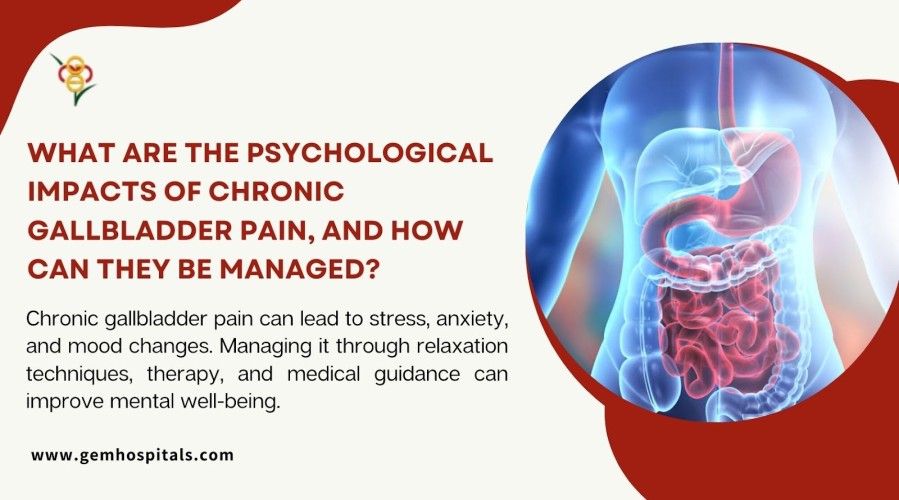Learn effective solutions for digestive problems with expert tips to improve gut health, reduce discomfort, and maintain a healthy digestive system.
What are the psychological impacts of chronic gallbladder pain, and how can they be managed?

In the morbidity resulting from the presence of gallstones or chronic cholecystitis, chronic gallbladder pain simply denotes more than mere suffering. They are generally a cause of anxiety and stress and other states that refer to mental disorder and depression. This review shows that it is possible to appreciate these psychological aspects, and gain specific information on how to cope with them, which would help enhance the quality of life in patients experiencing chronic gallbladder pain. Read on in this article where we discuss how chronic gallbladder pain affects the patient psychologically and how this pain can be managed.
Psychological Impacts of Chronic Gallbladder Pain
Pain in the abdomen related to gallbladder issues is really chronic and can inflict so much damage on the mind. Let’s look at some common psychological impacts:
1. Increased Anxiety
- Constant worry: The pain from chronic gallbladder issues is often constant and long-standing, so patients are always worried when the next attack may occur.
- Social withdrawal: Pain may precipitate withdrawal from social events since those with anxiety would avoid events in which they might embarrass themselves through a sudden pain episode.
2. Depression and Hopelessness
- Persistent sadness: Hypochondria that appears with chronic pain suggests hopelessness or a feeling of endless suffering, stimulating a depressive demeanor.
- Loss of motivation: Continued pain: Depression may also worsen chronic pain because it can make people too tired to seek assistance or do things that may assist in managing pain.
3. Stress and Irritability
- Physical toll on the mind: If the body is in pain, the brain will send stressful hormones within the body that contribute to getting easily irritated or have short fuses.
- Sleep disturbances: This chronic pain in the gallbladder results to poor sleep which in turn increases stress, the two creating a vicious cycle.
4. Fear of Medical Interventions
- Avoiding treatment: Certain people may be scared of processes like cholecystectomy a surgical procedure where the gall bladder is removed. It leads to one prolonging a certain ailment, and this is due to fear of experiencing the symptoms of both the physical and mental health.
How to Manage the Psychological Impacts of Chronic Gallbladder Pain
Therefore, detailed information on how to alleviate the effects of long term gallbladder pain on mental health is important. Here are some strategies that can help:
1. Mindfulness Meditation and Relaxation Techniques
- Calming the mind: About mindfulness meditation, the Best of both worlds idea have confirmed that it does effect stress and anxiety. Therefore, other formal methods like deep breathing and techniques of progressive muscle relaxation can be useful for performing pain control and lessening mental tension.
- Focusing on the present: People can enter it [pain management] via pursue mindfulness as the same enables persons to control how they respond to pain such that they do not consider the next pain episodes.
2. Cognitive Behavioral Therapy (CBT)
- Reframing thoughts: CBT is a therapeutic model which is focused on altering people’s thought processes and providing them with new ways of perceiving challenges in their lives. Misconceptions in people’s mind cause them to lose hope and they do not know how to handle the pain that they feel all the time because of the chronic pain.
- Working with a professional: With pain that goes hand in hand with anxiety or depression, a qualified therapist can deliver classroom learning on how to handle feelings of attrition.
3. Support Groups and Peer Networks
- Finding community support: Another complementary strategy is peer support from other chronic disease patients Since chronic diseases may take time to show an end point, while patients are managing the conditions, peer support may offer emotional soothing.
- Accessing shared resources: Friends groups are always helpful in providing some inspiration, what has worked for someone else and how they deal with mental health issues and chronic pain.
4. Regular Physical Activity
- Releasing endorphins: Even exercises like walking, swimming, light exercises, or doing yoga has a way of helping to release the feel-good hormones and reduce pain.
- Reducing stress levels: Physical exercise has been found to help to lower anxiety and depression because it leads to a feeling of achievement and general wellbeing through better sleep.
5. Consultation with a Mental Health Professional
- Seeking specialized support: It might be helpful to speak to a mental health care specialist to enhance the heel of those suffering from the mental effects of chronic gallbladder pain. Therefore, the therapists can come up with individualized intervention approaches that can address actual and perceived pain, which are both barriers to the improvement of the client’s quality of life.
- Medication when necessary: If the level of anxiety or depression is high, a psychiatrist may prescribe medications that will help to reduce the symptoms while the patient is under treatment for chronic pain.
Chronic gallbladder pain makes life miserable, and can lead to poor mental health and decreased quality of life. As for the psychological effects, they are rather severe: from anxiety through depression to stress. But, through use of mindfulness, therapy, support groups, exercise, and professional help, the mental complications arising from chronic pain can be handled.
In particular, those patients who require more extensive treatment and individual approach to the chronic gallbladder pain can use specialized services of Gem Hospital. Don’t let pain control your life; start your journey to pain-free life and Book an Appointment today.
Blogs & Article
Explore current research trends in digestive health, including new treatments, advanced diagnostics, and innovations improving gut health and patient care.
Discover common digestive health myths and the real facts. Learn simple tips to improve gut health and maintain better digestion for a healthier life.


